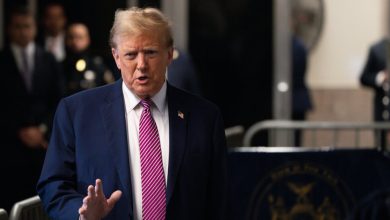What Biden Got Right on His Trip to the Middle East

Joe Biden campaigned and won as the antithesis to Donald Trump. To deliver on that promise in foreign policy, in his first year as president, he tried to offer “something for everyone,” as Anne-Marie Slaughter has argued: tough talk on China for the realists; a recommitment to NATO, to the Paris Agreement on climate, and to the World Health Organization for the liberal internationalists; an end to the forever wars; and, for the idealists, a willingness to speak up for human rights.
The last item on this long list, his attempt to return to a values-based foreign policy after the often incoherent and destructive “America First” presidency of Mr. Trump, has proved to be the toughest for Mr. Biden to get right. Beginning with his inauguration speech, to last year’s “Summit for Democracy” and his statements in support of Ukraine, Mr. Biden has returned repeatedly to the idea of “democracy versus autocracy” as an organizing principle for American foreign policy.
This binary way of looking at the world doesn’t always serve American national interests or the interests of people around the world who are fighting for their democratic rights to live freely and in peace.
Nowhere is this more clear than in Mr. Biden’s trip this week to the Middle East. The Biden administration doesn’t have a doctrine, per se. Instead, it has tried to rally free nations in a world where democracy is under threat. Mr. Biden has succeeded in building a European bulwark to Russian aggression in Ukraine, at least for the moment, but in the Middle East, his options are limited.
In an essay in The Washington Post on Saturday, Mr. Biden portrayed the trip as a mission to shore up peace in the region through diplomacy. “A more secure and integrated Middle East benefits Americans in many ways,” he wrote. There are a few factors he didn’t mention: Inflation is soaring; gas prices are alarming; his popularity is plummeting; and midterm elections are looming. The people he has met on this trip know all this, and some of them, especially in Saudi Arabia and Israel, may be hoping for a Trump restoration.
Mr. Biden’s first stop was Israel, which is in the midst of another government meltdown andsohas a caretaker prime minister, Yair Lapid, until elections are held on Nov. 1. Former Prime Minister Benjamin Netanyahu, the long-serving hard-liner, is hoping to make a comeback. The visit was short on substance, but Mr. Biden largely delivered what Israel wanted: a public statement, in a taped interview on Israeli television, in which he reiterated the U.S. position that it was willing to use force against Iran, “as a last resort,” to keep it from acquiring nuclear weapons.
Given the situation in Israel, there is little Mr. Biden can do to breathe life into the moribund peace process, and the visit took place just a couple of months after the death of a popular journalist and American citizen, Shireen Abu Akleh. She was killed while covering an Israeli military operation in the West Bank, and Palestinians are convinced that she was deliberately shot. They do not buy the State Department’s conclusion that while the bullet was likely fired by an Israeli, there was “no reason to believe that this was intentional.” Palestinians are also frustrated that Mr. Biden has not reversed some vindictive actions taken by his predecessor, such as closing the United States consulate in East Jerusalem, although he did pledge $100 million in funding for hospitals there.
On Friday, Mr. Biden met with the de facto Saudi ruler, Crown Prince Mohammed bin Salman, whose kingdom Mr. Biden, as a candidate, suggested should be a “pariah” over the horrific murder of the journalist Jamal Khashoggi in 2018. Mr. Biden’s administration last year released an intelligence report that laid the killing at the feet of the crown prince. Now, Mr. Biden, with this visit, is trying to reset relations with the kingdom to shore up the alliance against Russia and, more important, to pump more oil.
In Saudi Arabia on Saturday, Mr. Biden is expected to meet with nine Arab leaders — those of the six countries of the Gulf Cooperation Council(Saudi Arabia, Bahrain, Kuwait, Oman, Qatar and the United Arab Emirates)plus Jordan, Egypt and Iraq, whose major ask will be more military support against Iran. (Footage that surfaced this week from a 2021 incident in which Israel shot down Iranian drones with the help of Arab allies and the United States underlined the point.) At the same time, the U.S. administration hopes to leave the door open for the unlikely but worthy goal of reviving the nuclear deal with Iran that Mr. Trump ripped up — a revival that almost no one in the region seems to really want — while a shadow war of assassinations and covert actions between Israel and Iran continues.
This is not a pretty picture of diplomacy in action — an American president making nice with autocrats, with few opportunities to make meaningful progress on behalf of democracy.
America’s greatest strength in the world has always been its combination of high ideals and a readiness to engage with almost anyone when it served to advance peace and American national interests. This doesn’t mean the kind of amoral pandering to dictators practiced by Mr. Trump. Rather, it means building on areas of agreement, however small, that can be used to move toward a more peaceful, free and open world.
American presidents held regular summit meetings with Soviet leaders throughout the Cold War, achieving major arms-control agreements while remaining critical of Soviet human-rights violations. Richard Nixon’s visit to a totalitarian China in 1972 transformed America’s relationship with China and, eventually, China’s with the rest of the world.
There were few opportunities for Mr. Biden to show that kind of statesmanship on this visit, but that does not make incremental progress through diplomacy less valuable. Mr. Biden was right to release the intelligence report implicating Prince Mohammed in the assassination of Mr. Khashoggi; he is also right to recognize that the prince has made some headway on modernizing his kingdom, and that the alliance with Saudi Arabia is key to containing Iran, ending the conflict in Yemen, ensuring the security of Israel and restoring a modicum of stability to the oil market. Saudi Arabia’s work to restore unity among the countries of the Gulf Cooperation Council and to maintain a truce in Yemen showed the value of this relationship.
Mr. Biden is also right in not rejecting out of hand the Abraham Accords, which the Trump administration helped achieve. The accords marked a normalization of relations between Israel and two Gulf states, the United Arab Emirates and Bahrain, as well as Morocco and Sudan. Although they were criticized for, in effect, sidelining the Palestinians, the agreements formed a basis for other Arab states to consider forging relations with Israel. And he is right to talk to Saudi Arabia about an increase in oil production. Such a move is unlikely to have a significant impact on prices at American gas pumps in the short term, but it is essential — for the American economy and for the coalition supporting Ukraine — that Mr. Biden do whatever he can to ease the pressure on global oil markets.
While there is a natural impulse to look for grand gestures on every presidential visit abroad, there are other places and other issues where this administration needs to advance a broader and more ambitious agenda — especially climate change, Ukraine and China. This is not the moment for bold new Middle East policies. Mr. Biden is doing the right thing by treating the region’s issues as part of a bigger picture.
The Times is committed to publishing a diversity of letters to the editor. We’d like to hear what you think about this or any of our articles. Here are some tips. And here’s our email: [email protected].
Follow The New York Times Opinion section on Facebook, Twitter (@NYTopinion) and Instagram.



